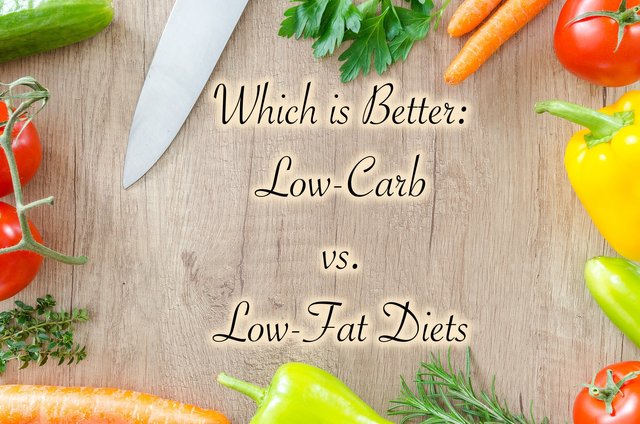Which is Better: A Low-Fat or Low-Carbohydrate Diet | Results from the DIETFITS Study

The Diet Intervention Examining The Factors Interacting with Treatment Success (DIETFITS) study examined whether genotypes, differences in insulin secretion, or both, predispose individuals to differential success in 12-month weight change while on a low-fat diet vs a low-carbohydrate diet.
The DIETFITS study was based out of Stanford University and was a single-site, parallel-group, trail that randomized individuals to a healthy low-fat diet or a healthy low-carbohydrate diet for 12 months.
Individuals were instructed to reduce their intake of total fat or carbohydrates to 20 g/d during the first 8 weeks. For example, in the low-fat group, the amount of edible oils, fatty meats, whole-fat dairy, and nuts were reduced, whereas in the low-carbohydrate group the amount of cereals, grains, rice, starchy vegetables, and legumes were reduced. Carbohydrates or fats were then introduced back slowly to their diets in increments of 5 to 15 g/day per week until they reached the lowest level of intake they believed could be maintained indefinitely. No explicit instructions for energy (kilocalories) restriction were given.
Both diet groups were instructed to (1) maximize vegetable intake; (2) minimize intake of added sugars, refined flours, and trans fats; and (3) focus on whole foods that were minimally processed, nutrient dense, and prepared at home whenever possible.
Results
A total of 609 individuals completed the study. Among participants in the healthy low-fat diet group, 130 (42.6%) had the low-fat genotype and 83 (27.2%) had the low-carbohydrate genotype, whereas in the healthy low-carbohydrate group, 114 (37.5%) had the low-fat genotype and 97 (31.9%) had the low- carbohydrate genotype.
In the healthy low-fat diet vs the healthy low-carbohydrate diet, the mean 12-month macronutrient distributions were 48% vs 30% for carbohydrates, 29% vs 45% for fat, and 21% vs 23% for protein, respectively.
Primary Outcome: Change in Weight at 12 months
The mean 12-month weight change was −5.3 kg (95% CI, −5.9 kg to −4.7 kg) for the healthy low-fat diet group and −6.0 kg (95% CI, −6.6 kg to −5.4 kg) for the healthy low- carbohydrate diet group, which was not statistically different.
In addition, there was no significant difference in weight change among participants matched vs mismatched to their diet assignment based on their genotype pattern. There was also no significant differences in body mass index, body fat percentage, and waist circumference between the two groups.
Secondary Outcomes: Changes in Cholesterol
At 12 months, both diets improved lipid profiles and lowered blood pressure, insulin, and glucose levels.
The 12-month changes in low-density lipoprotein (LDL) cholesterol concentrations significantly favored a healthy low-fat diet. Whereas, High-density lipoprotein (HDL) cholesterol concentrations increased significantly more and concentrations of triglycerides decreased significantly more for the healthy low-carbohydrate diet group.
In Conclusion
The DIETFITS Study showed that there is no significant difference in weight change between a healthy low-fat diet vs a healthy low-carbohydrate diet, even after adjusting for genotype pattern and baseline insulin secretion.
I wonder how a specific diet effects the way our body functions when we eat the same things over and over because there are so many specific benificial nutrients coming from certain foods and if we only eat a few things we like we end up becoming deficient in the nutritients from the foods we avoid, and in my opinion could have a negative outcome even tho technically we are eating healthy. Maybe a routine should be balance with a new set of foods each week in a cycle to take advantage of maximum supplimemtal intake and make our bodies work to proccess what we need in a random order instead of building a routine that bores us and our body.
Nice to see someone else talking weight loss and health here. I lost "half my size" and few years ago and keep my weight stable easily now.
My diet recommendation is summarized by "Don't Eat Poison." I don't care why you choose to eat as long as it is not processed and full of pesticides, gmos, chemical additives for color and flavor etc. Our bodies are not equipped to handle that.
Food is good - poison is bad. I have seen many more people than me get healthy with this method over the last years.
I'm coming to you from @kyrptonia with the same user name.
I'm from US, and it's awfully hard to avoid poison. GMO in the seeds, chemtrails above, and now they're coming out with 5G wifi, with nowhere to escape. Saw a great youtube video wherein some students planted a bunch of seeds on a planter sitting atop a WIFI router, and the second bunch of seeds in a planter a few feet away. I'm sure you can guess which thrived, and which died. Recently heard of a new book, 'The plant paradox' more bad news...
upvoted, kryptonia-edenjevy oliveros
Interesting, I guess eat healthily and exercise will always be the best way to live.
Upvoted task from kryptonia @stevehuggett
thanks for sharing i need this..
@jezz90 of krypto
@aceace kryptonia
nice post :)
kryptonia @vote-transfer
upvote :)
kryptonia @steemizm
Your Post Has Been Featured on @Resteemable!
Feature any Steemit post using resteemit.com!
How It Works:
1. Take Any Steemit URL
2. Erase
https://3. Type
reGet Featured Instantly � Featured Posts are voted every 2.4hrs
Join the Curation Team Here | Vote Resteemable for Witness